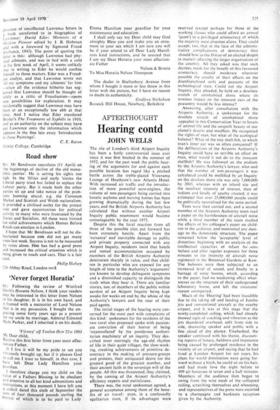AFTERTHOUGHT
Hearing contd
JOHN WELLS
The site of London's third Airport Inquiry has been a hotly controversial issue ever since it was first bruited in the summer of 1952, and for the past week the public hear- ing of the arguments for and against each possible location has raged like a pitched battle across the treble-glazed Visterama Lounge of Heathrow's new Atlantis Hotel. With increased air traffic and the introduc- tion of more powerful aero-engines, the volume of non-passengers being carried into lunatic asylums and nursing homes has been growing dramatically during the last few years. and the British Airports Authority has calculated that without another Airport Inquiry public resentment would become unmanageable by the year 1975.
Despite this the local reaction from all three of the possible sites put forward has been extremely hostile. Apart from the 'nuisance' and inevitable damage to public and private property connected with any Airport Inquiry, residents insist that hotels and rented accommodation occupied by members of the British Airports Authority deteriorate sharply in value, and that child- ren in particular who are exposed for any length of time to the Authority's 'arguments' are known to develop delinquent symptoms and a diminished capacity to distinguish the truth when they hear it. There are familiar stories, too, of members of the public within earshot of an Airport Inquiry being kept awake for weeks on end by the whine of the Authority's lawyers and the roar of their paid agents.
The initial stages of the hearing were con- cerned for the most part with complaints of this kind: spokesmen for the residents of the two rural sites proposed spoke with passion- ate conviction of their horror of being `steamrollered' by the ponderous authori- tarian machinery of an inquiry. They des- cribed most movingly the age-old rhythm of life in their quiet villages, the slow-work- ing, creaking achievements of primitive de- mocracy in the making of pressure-groups and protests, their antiquated desire for the greatest good of the greatest number, and their ancient faith in the sovereign will of the people. All this was threatened, they claimed, by the coming of the Airport Authority's efficiency experts and statisticians.
There was, the rural spokesman agreed, a general acceptance among them of the bene- fits of air travel: even, in a confessedly egalitarian state, if its advantages were reserved (except perhaps for those of the working classes who could afford an annual `jaunt') to a privileged artistocracy of which the majority were absentee aliens. They could accept, too, that in the face of the adminis- trative complications of democracy they should bow to the Diktat of an elected despot in matters affecting the larger organisation of the country. All they asked was that such decrees, made for the benefit of this favoured aristocracy, should moderate wherever possible the cruelty of their effects on the disenfranchised serfs and peasants of the technological state. Could not the Airport Inquiry, they pleaded, be held on a desolate stretch of uninhabited shore where its noxious impact on the innocent ears of the peasantry would be less intense?
Answering, after consultation with the Airports Authority, a spokesman for the desolate stretch of uninhabited shore appealed in this Conservation Year to lovers of animal life and the unspoilt beauty of our planet's deserts and mudflats. He recognised the rights of man, but what of the ecological balance? What of the tiny shell-fish, to which man's inner ear was so often compared? If the deliberations of the Airports Authority's Inquiry could have so terrible an effect on man, what would it not do to the innocent shellfish? He was followed on the podium by the Airports Authority's lawyer, who said that the number of non-passengers it was calculated could be mollified by an Inquiry on the desolate shore site was only 7,000,000 by 2005, whereas with an inland site and the resultant intensity of interest, then of tedium and finally of apathy created, it was estimated that over 25,000,000 people could be politically neutralised for the same period.
Tests were then carried out, and a second member of the Airports Authority team read a paper on the harmlessness of aircraft noise while a third member of the team studied the effects of his colleague's paper on child- ren in the audience, and monitored any dam- age to the democratic structure. The paper remained below the `acceptable' level of distortion, beginning with an analysis of the intellectual capacities of infant ba:aons before and after regular exposure for three minutes to the intensity of aircraft noise registered in the Botanical Gardens at Kew. The baboons were then subjected to an increased level of sound, and finally to a barrage of sonic booms, which, according to the paper, had no weakening effect what- soever on the structure of their underground laboratory home, and left the creatures' reason unimpaired.
Much of the 'Hearing' had been inaudible due to the taking off and landing of Jumbo jets and conventional aircraft at the nearby airport, and it was at this stage that the newly-completed ceiling, which had already showed signs of cracking and vibration as the jets thundered overhead, split from side to side, showering speaker and public with a fine cloud of dry plaster. Unabashed, the speaker continued with his theme, discount- ing reports of lunacy, baldness and impotence being caused by prolonged residence in the vicinity of an airport, and saying that he had lived at London Airport for ten years, his plans for world domination were going for- ward without a hitch, he could sit on his hair, and had made love the night before to 409 air hostesses in seven and a half minutes. Members of the audience then began to
swing from the wire mesh of the collapsed ceiling, scratching themselves and whooping, and representatives of the press were escorted to a champagne and banknote reception given by the Authority.






































 Previous page
Previous page